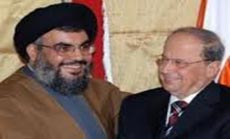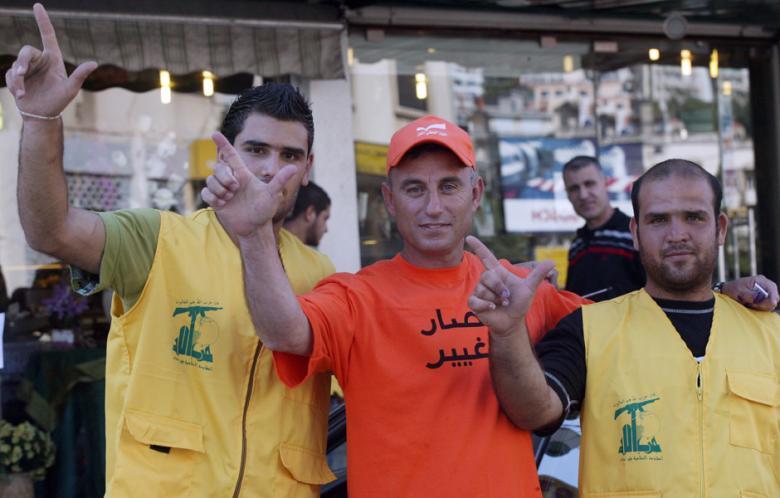
Aounists Are Happy: We are Free from March 8...Coalition is Sturdy

Elie Ferzli - As-Safir newspaper
Talk about a gap between March 8 camp and the Free Patriotic Movement is not groundbreaking. Since 2006, FPM lawmakers and officials kept saying they were not part of the camp, born on March 8, 2005, hoisting the "Thank you Syria" motto.
 Even the insistence of rivals on merging Aounists with March 8 is sheer provocation.
Even the insistence of rivals on merging Aounists with March 8 is sheer provocation.
There is then nothing new in what House Speaker, Nabih Berri, said about the camp. He only confirmed what is already known, at least according to Aounists, who consider that their relation with March 8 stemmed from the understanding with Hizbullah and then developed into a strategic alliance aimed to protect stability, make reforms, and build the state.
The Aounists are quite sensitive to this fusion which they could not manage to hide, even though it is an irrevocable fact that when March 8 took to Riad al-Solh, the FPM was in opposite Martyrs square.
The Aounists see that their accomplishment is in principle bringing the two squares together.
What Berri said was not new. He has even said that Aoun was right when he noted key differences on the internal level.
Still, what was remarkable was his point that everyone was now free in their choices on the internal level, whether pertaining to the cabinet or the Parliament or any other dossier. A thorough follow up on Berri's Wednesday meetings shows the Speaker's attempt to jettison the burden of dispute on the blocking third.
Berri himself has confirmed that he was no more negotiating in the name of the Shia duo, seeking to have five ministers in a 24-member cabinet. For its part, the Change and Reform bloc has also called for five [three for FPM, one for Tashnag party, and one for Marada Movement].
This means that March 8 forces seek 10 out of 24 ministers, which is the third plus two members.
This is not a funny joke for Future movement, which indeed buys Aoun's confirmation that his coalition with March 8 is solid in strategic affairs.
Bottom line, Future understands that Aoun will not abandon the Shia duo if it decides to quit from the government and then to torpedo it.
In a nutshell, if negotiating with each side apart means that Aoun will not interfere in his allies' selection of portfolios or vice versa, there is no way that Aoun accepts to be part of a government that does not include Hizbullah for instance.
All the aforementioned indicates that two parties agree that nothing major has changed in the relation between the allies, although some wish to see disparity grow between Berri and Aoun. It also indicates that the House Speaker has made an intervention that, in worst case scenario, is not harmful at all, especially that the Prime Minister designate Tammam Salam began his week with a verve to kick off a new round of talks on Aoun's new "positioning." Some MPs who had attended that last Wednesday meeting, in which three members of the Change and Reform bloc partook, downplay accusing Berri of maneuvering. They say, "Is it possible that Berri maneuvers in such an overt way?" They add that Berri sought to give a new push to the stumbling cabinet formation process.
Tackling the divisive internal dossiers may take a long time. The disagreement, albeit serious, does not affect the underway communication between Hajj Wafiq Safa and Aoun and his minister Gibran Bassil.
Although both parties have disagreed on the House mandate extension and on the extension of the mandate of security chiefs, convergence between Hizbullah and FPM did not start when they both shared one opinion on Syria's situation or the elections law. Agreement shall not as well end when it comes to the weapons of the Resistance or the conflict with "Israel".
This does not mean that Hizbullah is doubt-free on a severance of ties with Aoun over the extension issue, especially after the party has seen an unusual reaction from Aoun. Yet it is possible that March 14 forces have contributed to widening the gap between both sides as their MPs boycotted a House session that was devoted to extending the term of the army chief.
Even Berri, who dashes to remind of the dispute with Aoun before lauding the man, has said outspokenly to Premier Najib Mikati, when they were discussing the schedule of the House session at Baabda palace during their meeting with President Michel Sleiman: "If I had to choose between the items Aoun wants and those you are concerned with, I would side with Aoun."
All this leads to confirm that alliances are unswerving. Aoun's main objection was not relevant to his allies' conviction of the necessity to extend the term of army commander General Jean Qahwaji, but to disallowing any side to take their decisions alone. The FPM sees that "alliance means that decision must be taken jointly, and not that we execute decisions taken by others."



